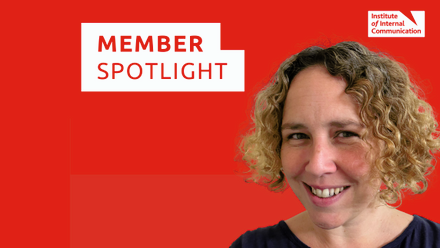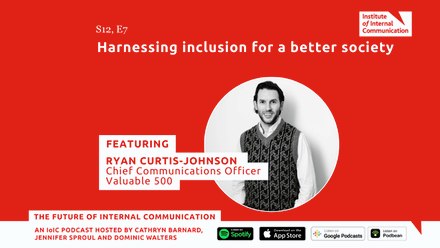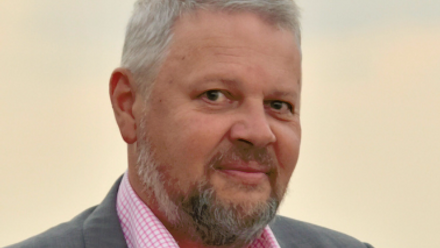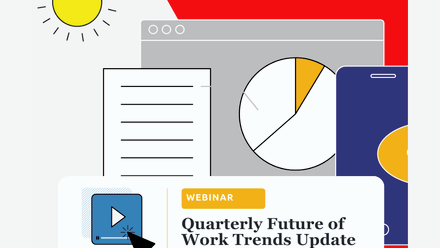Follow the live blog here for day one, where we'll grab the top nuggets of wisdom from the day as they happen.
You can also follow the day on Twitter using #IoICFestival22 – and if you're here and have something to post, please use the hashtag (and we may pinch your post for our blog).
10:16
IoIC chief exec Jennifer Sproul says we are still in a period of understanding, and trying to create a sense of belonging in the work we do.
"Creating community in these times remains more important than ever. As communciators, we help and advise our leaders, and ensure our people feel informed, connected and purposeful. The challenges are vast, but the opportunities are vast."
10:28
Our opening keynote is by Dan Sodergren, co-founder of YourFlock.co.uk and digital marketing and tech expert for the BBC.
He starts by telling us “Your physiology affects your psychology.” He has us all on our feet, shaking away negative energy, smiling and applauding…
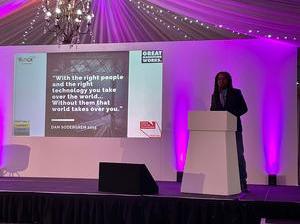
10:38
Dan asks us to write down three things that make you you. What are your three things?
10:44
Dan Sodergren: “Very few people post-Covid are engaged in their workplace, which makes our job harder. Especially younger people – they will take a pay cut to go to a better job. People leave bad bosses. If your employees think they are heard, they perform five times better.”
10:49
Dan Sodergren reflects on the post-pandemic/pandemic period: “Uncertainty is one of the worst human emotions. Uncertainty slows down people, stops businesses. We are feeling more socially isolated than ever.
“We have got to get better at communicating. Every ten minutes you spend getting comms right could save an hour of uncertainty. You have got to take hold of this mantle. If managers don’t communicate, mental health declines.”
10:52
Dan Sodergren reflects on a new hybrid workplace: “When people meet in offices, cultures appear. When you do stuff together, you like each other more. If you take that away, you need to communicate more passionately and empathically.”
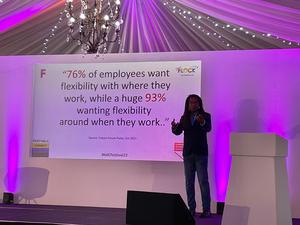
11:06
Dan Sodergren talks about DALL.E.2 – an amazing bit of artwork kit that creates an image from any phrase you type in – however precise (and shows some great examples, including teddy bears working at a computer on the moon in the 1980s! We could get addicted to it...).
How could something like this help you in the future?
11:12
Dan Sodergren talks about how AI can add value. For example, sites like Crystal Knows and Humantic, can help us use DISC profiles to help us better communicate.
11:20
In the first of two sessions starting now, Sarah Bowness, learning and development partner at retail pharmacy Walgreen Boots Alliance, and Craig Smith, owner of The Big Picture People, talk about the gamification of management communications.
In the second session running now, Scott Fulton, founder of Digital Rebels and host of the Rebel Diaries podcast, considers how Internal Comms teams can become unstoppable, stop wasted effort and finish work with a smile every day.
11:27
Sarah talks about No.7 Beauty Company’s Manager Effectiveness Model.
“We found people were being promoted because they were technical experts, not because they were brilliant leaders,” she says. “We were trying to give them the skills they needed, but hadn’t been explicit in our expectations.”
The team came up with the two roles – organise and align; engage and develop – and the eight behaviours expected of managers. But then Sarah’s team had to think creatively to bring it to life during the pandemic. A diagnostic tool was developed for leaders to identify their strengths and development gaps, and Sarah then partnered with Craig to come up with the concept of a game to sustain this.
“Gamification makes things that are dry more inspiring and interesting,” says Craig. Used appropriately, it can improve engagement. It’s about creating conversations.”
11:35
The initial plan was for a physical game, based around dialogue – getting people to discuss topics and challenges around line management (Facilitation was also important, says Craig: “You need someone to curate the process.”)
When Covid prevented face to face sessions, Craig printed a large A0 version of the game, with a webcam suspended above and it was piloted with colleagues digitally… and it worked successfully enough that the game could be played over Teams. An app helped, so at the same time, managers could engage in other ways. “They are interacting, not just listening,” says Sarah.
11:41
The game involved moving around a board, with a simple virtual dice, racing another team to the end and answering questions as they went.
“Keep the game mechanic simple,” advises Craig.
“Keep the numbers small,” adds Sarah. “Having smaller groups improved the depth of conversations.”
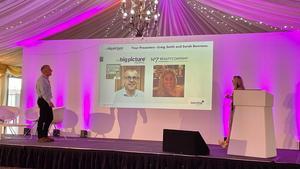
11:50
Scott Fulton discusses the four key principles of taking a modern agile mindset:
- Make people awesome: everything we do is for a customer benefit; audience empathy is a superpower – understand their needs; always back decisions with evidence.
- Deliver value continuously: regularly review against the higher value; the world is changing rapidly, so deliver against high chunks; surprise can be an opportunity to deliver high value
- Make safety a prerequisite: effective teams have psychological safety – they feel included, safe to learn, safe to contribute ad safe to challenge the status quo
- Experiment and learn rapidly: if you treat everything as an experiment, it’s hard to fail; assumptions are your enemy; give colleagues 10% time per month for personal development
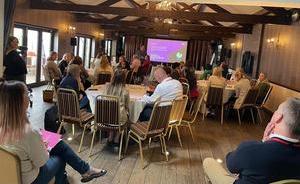
12:13
In our session ‘conversations that shape culture’, Mohammed Osman from Johnson Matthey and The Culture Club’s Nikki Burslam talk about AirTime, a framework for groups of around 20 employees to have a conversation at Johnson Matthey during its Clean Air division’s transformation.
With leaders engaged as facilitators, one of the most frequent questions was: How we keep this positive and stop people moaning?
Nikki says “You don’t. This is the forum for people to say what they are worried about, but use the forum to discuss what you can do about it.”
12:21
A key part of AirTIme was creating a formula for conversation. “Create the formula that works for you,” says Nikki. "Having champions helped. Without a doubt, those champions – PionAirs – were a major part of the contribution."
12:24
Mohammed was an applications engineer at Johnson Matthey, who signed up as a PionAir and then joined the IC team.
“ArirTime felt fresh – it was open and honest,. I realised how powerful IC could be when executed properly. If you ignore problems, you are not moving in the right direction. Through discussions, you can identify roadblocks to people and you build trust and go forward together.
“And get leadership involved. Airtime works because you are having a conversation with someone powerful enough to make a difference.”
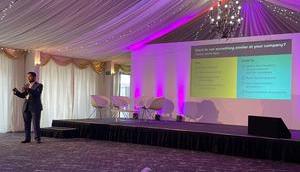
12:29
“Don’t expect positive discussions. I encourage people to get negative things off their chest. If you don’t allow people to say things we don’t want to hear, we can’t work to address them and we are not being open and honest.”
12:32
The AirTime programme at Johnson Matthey has led to three key benefits:
- A change in culture. Leaders and employees are more comfortable having open conversations outside AirTime.
- Transformation was understood and became less scary. People take pride in knowing where their behaviours contribute to the business’s success.
- Change is led by everyone, not just leaders. There had been an expectation that leaders would instigate change, but PionAirs are empowered to tell leaders what they have heard and actions based on what colleagues want to see change.
12:46
The AirTime programme started from the top and leadership input was vital. The CEO ran an AirTime session with her team, and that team ran sessions with their teams. PionAirs have more of an active role in countries where English wasn;t a first language, and they interpret and translate for leaders.
12:48
When asked how the team tackles questions and issues that come up time and again, Nikki explains: “People are more realistic and know everything can’t be acted upon. But saying why not is better than brushing it under the carpet. Close the loop and be transparent.”
13:52
In one of our early afternoon sessions, communication leader and founder of #WeLeadComms Mike Klein joins us via Zoom from Arizona (at 5.30am his time!) to talk about superconnection – the next IC superpower.
13:56
Mike Klein: “IC pros have tended to think of our role as being about messages, channels, distribution. We broadcast. And sometimes when we’re allowed, we listen. Superconnection shifts the focus from talking and messages, to changing the DNA of the organisations and communities in which we operate – connecting the right people on a one-to-one basis, when we hit pause on educating and entertaining, and connect audiences of two in a methodical way.
“The key is to recognise we are not just here to communicate, broadest and educate. We are here to connect our organisation. This is a shift in power.”
14:03
"When you find the powerful and most connected people in your organisation, introduce them to people who need most help." – Mike Klein.
14:13
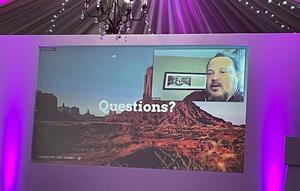
Questions for Mike about superconnections...
What if we don’t have permissions to do a superconnection programme?
Mike: “The cost involved are minimal. Proposing it to the organisation and asking permission may show a level of initiative they are not used to from Internal Comms, but you can start with three, five or ten super connections a month and do it alongside your usual job.”
Isn’t this what we should be doing – networking?
Mke: "This is an intentional approach. You are saying you are going to make it part of my job, and mission, and extract a cost to it and feed that back to the organisation."
15:06
A focus group session looked at the successes and challenges of hybrid working. In groups of four or five, delegates are sharing their experiences.
Among the successes:
- Identify champions to support and encourage people when they are in the office
- Create a more welcoming environment, so people want to come in to the office on certain days
- Creating manager toolkits – to support line managers to lead in the new environment
Among the challenges and considerations:
- Events – is a hybrid event the worst of both worlds?
- Can you please everyone? A single policy cannot support everyone’s needs?
- What does getting back to face-to-face events mean for our carbon footprint?
- Some organisations still have an audience where many employees have high anxiety around Covid
15:31
Our afternoon panel sessions is on ethics in internal communication, with Shalini Gupta, employee experience manager for BT; Wendel Verbeek, head of internal and transformation communication for London Stock Exchange Group; and Oli Howard, membership strategy lead at the CIPD.
Shalini reflects: “Every content we send out, there is a question: is this transparent? Is it accurate? Is it misleading our people? Is it inclusive? Does it impact people at the right time?”
15:39
Oli Howard: “How we communicate in organisations is symbolic to what behaviour we think is tolerable. If we distort and spin in IC, we are sending a message that that’s OK for colleagues to do with each other or with customers. If we exclude colleagues in our comms, we are legitimising exclusion. The role we have is playing a part in managing the relationship between employees and employees.”
15:50
Where do you draw the line between being positive and something becoming spin?
Wendel Verbeek: “You can’t spin what you’re saying internally. Your audience will hold you accountable of anything you say. When you have employee listening that is appropriate, if there is a hint of spin, it comes back to you and you lose your licence to operate.”
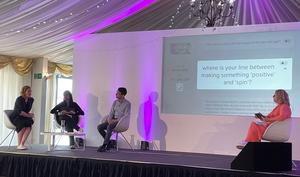
16:00
Is there an argument that ICers should refuse to communicate something that in unethical as there are also personal consequences?
Oli Howard: “We are some way off having recognisable standards we should adhere to, but we are moving in that direction. The IoIC code of conduct makes it clear what situations IoIC would look into. We should take it seriously because we want to do the best for our organisations and employees, and not because we want to retain our membership status.
Shalini Gupta: “The more we talk about it as communicators – and we don’t do enough about it – the greater clarity and support we have to challenge unethical communication.”
16:22
Christina Patterson, writer, broadcaster and critic for The Sunday Times, provides our closing keynote about “how to hit a heart”. How do we make people sit up and listen and how can IC sit up above the noise?
16:38
Christina shares the impact of using short words in her columns for newspapers – when using shorter words, she receives more comments from people about how emotional her columns are. No one is looking to read how clever you are…
16:45
Christina Patterson: “Wherever you were on the Brexit debate, the better campaign won. ‘Taking back control’ was a memorable slogan. Who doesn’t want to take back control?”
16:48
“The thing about messages, it’s all about what people care about, and internal communicators’ jobs is understanding what people care about,” says Christina.
“There are things we are told we should care about – some of which we might not care about. Those topics are for our hearts.
“There are things we are told by our bosses we should care about – missions and values, the share price. But care has to be earned. It doesn’t just happen. But if you don’t care first, you can’t make other people care.”
16:52
Christina Patterson: “If you want to understand people, ditch the business books. Read fiction: Meg Mason, Tolstoy, Sally Rooney, Hamlet – they understand the heart.”
17:01
How do we make copy sparkle and engaging when we are repeating or reinforcing well-worn messages?
Christina: “Find the heart of your communication. What’s the point? What are you trying to say? What’s current? A good way to bring something alive is to relate it to something that’s going on. Where should it hit someone’s heart? If they didn’t care about it last time, why not? Did you use too many long words? Did you give too much information? The principles are the same: cut the crap.”
17:11
And that's the end of day one... apart from drinks and dinner with a view of the hills and fields. Until tomorrow...

